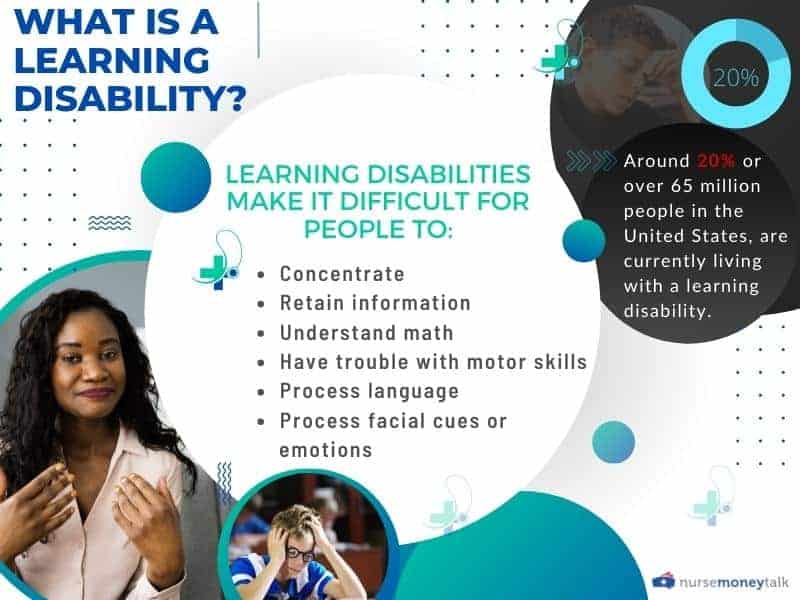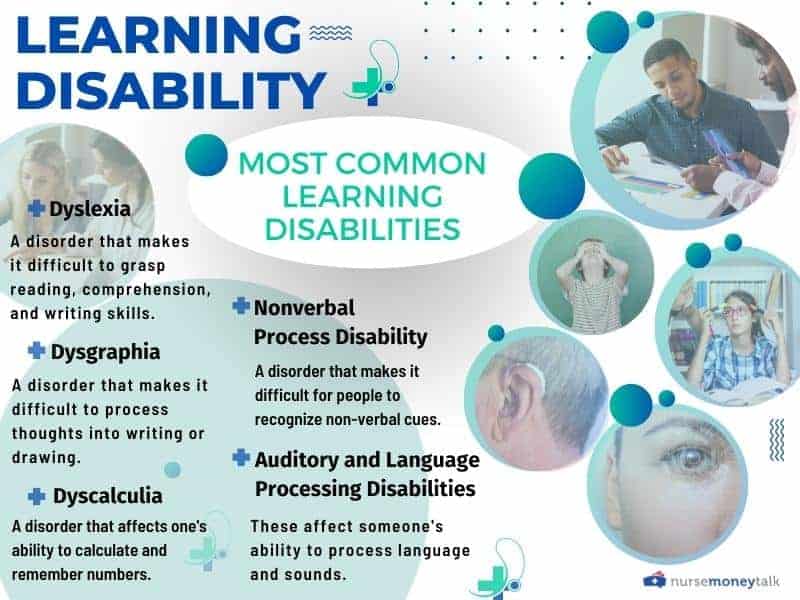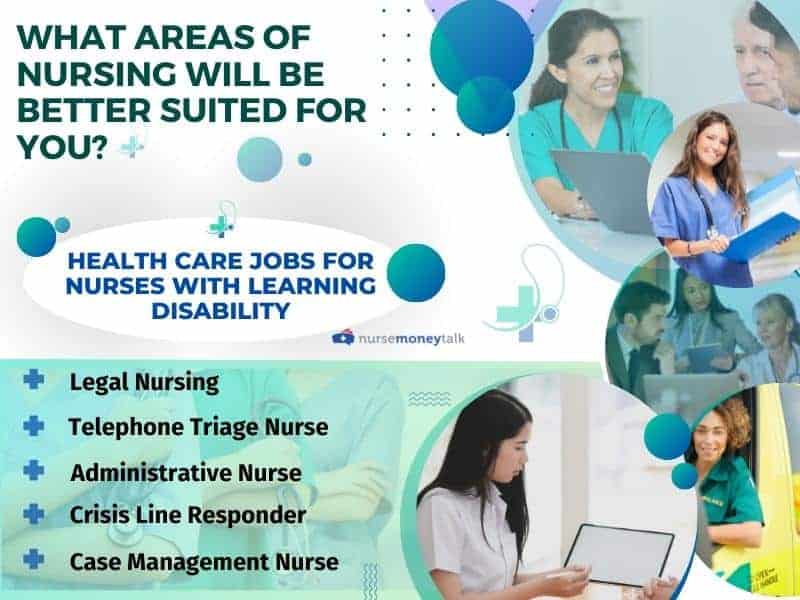Becoming a nurse and working in the medical field can be a rewarding career choice for anyone!
Working as a nurse, you’ll be able to interact with people that have mental illness issues, need care and comfort, and even have disabilities.
*Disclosure: This article on can you become a nurse with learning disability may contain affiliate links. If you click and make a purchase, I may receive a commission. For more info, please see my disclaimer.
Can You Become a Nurse if You Have a Learning Disability?
A learning disability should not stop you from working as a Registered Nurse or a Licensed Practical Nurse. However, it’s something to consider when applying for nursing school and applying for nursing jobs.
Find Nursing Programs
Search our school database to find schools and get information on the right programs for you. (Don’t worry, it’s fast and free!)
What is a Learning Disability?

It’s estimated that around 20%, or over 65 million people in the United States, are currently living with a learning disability.
There are various types of learning disabilities that make it difficult for people to:
- Concentrate
- Retain information
- Trouble with math
- Trouble with motor skills
- Process language
- Processing facial cues or emotions
Do I have a learning disability?

It’s important to look out for the signs of a learning disability and be properly diagnosed with a disability before considering applying to nursing school or nursing jobs.
You’ll want to make sure you really do have a disability, and there is not a more serious issue going on which can co-occur with a learning disability.
These include:
- Bipolar disorder
- ADHD
- Issues with the brain cortex
- Issues involving tics
Your medical provider will inform you of your diagnosis and whether or not you have a learning disability or a co-occurring disorder.
Some of the most common disorders that constitute a learning disability include:
- Dyslexia: A disorder that makes it difficult to grasp reading, comprehension, and writing skills. If you’ve had trouble in the past with these types of skills, it’s important to know that dyslexia can be undiagnosed for many years.
- Dysgraphia: A disorder that makes it difficult to process thoughts into writing or drawing. This can lead to poor handwriting, which is one of the signs of this condition.
- Dyscalculia: From not being able to tell time to other issues with math problems, this is a disorder that affects one’s ability to calculate and remember numbers.
- Auditory and language processing disabilities: This diagnosis affects someone’s ability to process language and sounds.
- Nonverbal Process Disability: These are disorders also known as NLD, which make it difficult for people to recognize non-verbal cues such as facial expressions and emotions.
Related: Can You Become a Nurse if You Have Bipolar Disorder?
Factors To Consider
If you have a learning disability, chances are you’ve already been diagnosed and understand what works best for you in school and learning.
By getting the help of a professional, you can be better assisted in your journey toward becoming a nurse.
It’s important to note that nursing school is not easy. In fact, around 20% of students end up dropping out of nursing school altogether!
Nevertheless, if you are determined and want to attend nursing school, there’s no reason you can’t apply and finish your four-year degree or attempt to obtain an associate of science in nursing degree first.
Remember, your school is required to make accommodations based on your learning disability, as is your place of employment. This is per the Rehabilitation Act and Americans with Disabilities Act.
Accommodations to Ask For
There are several ways you can ensure you can complete your nursing school with as much support and accommodation as possible.
These can include:
- Extra time for tests
- Ability to answer via computer
- Accommodations with test scheduling
- Ability to give verbal responses instead of written responses
In addition, you can also hire a tutor or continue with occupational therapy so you can be better prepared for nursing school.
Once you pass nursing school, pass your NCLEX, and get your first job after nursing school, your hospital will also need to accommodate you based on your disability.
Working as a Nurse

Consider what nursing specialties are best suited for you.
For instance, if you have a learning disability involving numbers, administering medication might not be a suitable fit.
Don’t worry.
There are many jobs you can work in as a nurse that allows you to play a vital role in caring for patients while not putting a patient’s safety at risk.
These include:
- Working as a crisis line responder
- Working in telephone triage
- Working as an administrative nurse
- Legal nursing
- Case management
These are all excellent career choices for nurses with learning disabilities to pursue.
In the end, it’s best to examine your specific disability and determine if you’re a good fit for the nursing job you’d like to pursue.
Play to Your Strength!
You might read this and think that having a disability means you can’t be a good nurse, or you’ll be limited as a nurse. I don’t believe this is the best way to look at it.
The best way to look at it is that you should go for a job that plays to your strengths.
Even for nurses who don’t have a learning disability, getting a job that plays to their strengths while hiding their weaknesses would still be good advice for any nurse.
For instance, a nurse who’s an introvert should focus on jobs limiting their interactions with patients. Hence why I made a list of the best jobs for introverted nurses.
The same is true for nurses with high anxiety and need low-stress nursing jobs.
Do you see what I mean?
Don’t Throw In the Towel
We’ve come a long way from discriminating against different races, genders, and disabilities!
There are now laws in place that protect students and people in the workforce with physical, mental, and learning disabilities. These, of course, include nurses.
If you’d like to pursue a career as a nurse, don’t let your learning disability stop you.
Always ask for extra help, and when you’re ready, check out our website for the best nursing schools and jobs.
Get started with a rewarding nursing career today!
Find Nursing Programs
Search our school database to find schools and get information on the right programs for you. (Don’t worry, it’s fast and free!)
Have You Read These Yet?
- Can You Become a Nurse with Depression?
- Can You Become a Nurse with One Eye?
- Can You Become a Nurse with Schizophrenia?
- Can You Be a Nurse with a Felony?
- Accounting vs Nursing


Hey. I have dyslexia and central processing. I am looking to go to nursing school. Do you have any thoughts?